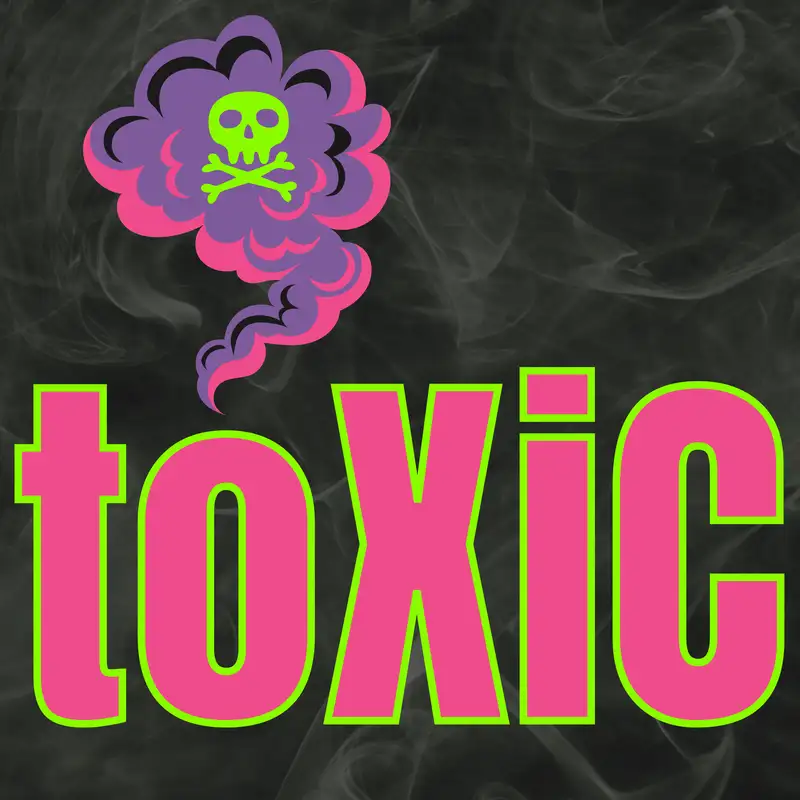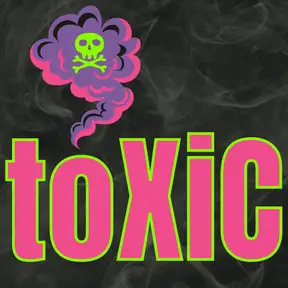
Taking Back Your Name and Space
Welcome back to Toxic, where we
get real about family dynamics that
damage us, and how to break free.
No sugarcoating, no
pretending it didn't happen.
just honest conversation about toxic
family systems and how they shape us.
Today I'm sharing
something deeply personal.
How even our names can become
weapons in the hands of toxic people.
If you've ever diminished yourself
to survive, this one's for you.
Let's talk about what bullying really is.
In toxic family systems, it's not
just the obvious stuff, the shouting,
the hitting, the direct insults.
It's often more insidious.
It's the consistent, persistent
undermining of your sense of self
turning your traits into flaws.
Making you feel fundamentally
wrong for existing exactly
as you are in toxic families.
Bullying isn't random.
It's targeted and specific.
It identifies what matters
to you and weaponizes it.
It finds your vulnerability and exploits
them repeatedly until you start believing.
The problem is you not them.
Here's what makes family bullying
different from schoolyard bullying.
There's no escape at school.
The bell rings.
You go home.
But when?
Home is where the bullying
happens, where do you go?
You retreat inward.
You make yourself smaller.
Try to become invisible in your own life.
I see this pattern
constantly in my practice.
Adults who speak to quietly, who
apologize for taking up space,
who deflect compliments because
positive attention feels dangerous.
Who've learned that the safest
version of themselves is the smallest,
quietest, and least noticeable version.
And if you're listening and still
living in a toxic family environment,
I want you to hear something clearly.
The problem isn't you.
It never was Toxic people need targets
to discharge their own dysfunction.
You are convenient, not deserving.
The patterns of diminishing
yourself that you learned to
survive aren't character flaws.
They're adaptations.
They kept you safe when
safety wasn't guaranteed.
but the same patterns that protected
you then may be limiting you.
Now the first step in healing
isn't even changing the patterns.
It's recognizing them as what they
are brilliant survival mechanisms that
you no longer need to the same degree.
It's seeing how you've been conditioned
to take up less space than you deserve.
Bullying doesn't just happen with
direct and insult or physical threats.
Sometimes it's more subtle.
Sometimes it's taking something
that should be safe like your own
name and turning it into a trigger.
And when that happens, we often
respond by making ourselves smaller.
We find ways to take a less less space,
be less noticeable, less of a target.
I know this because I lived
it for as long as I remember.
I've gone by JON instead of Jonathan.
Seemed like a simple preference,
a nickname, nothing more.
But looking back with the perspective
I have now, I can see it was
actually one of the many ways I
learned to make myself smaller.
My mother had this way of singing.
My full name, Jonathan.
She made up a song in this
exaggerated mocking tone.
Wasn't playful or affectionate.
It was a taunt, a way to let me know I
was being too much, taking up too much
space, or asking for too much attention.
Jonathan.
Jonathan should sing the song
when the family was all there,
lots of people around to join
in on the fun point and laugh.
The message was clear keep
Jonathan in his place.
So I became John three
letters instead of eight.
Less of me to criticize, less of me to
mock, less of me to reject, and certainly
I have nothing to do with that song.
Kids at School would sometimes take the
joke I remember when I wrote it on my name
for one of the first times I was proud,
one of my classmates called it a toilet.
The John.
I laughed along while feeling
that familiar shame creep in.
but that schoolyard teasing
was nothing compared to how my
name became a weapon at home.
What's remarkable about this kind of
subtle emotional abuse is how thoroughly
it becomes encoded in your nervous system.
up until very recently, hearing my
full name in certain tones could
trigger that feeling of shame.
The same urge to disappear.
I'm happy to say that's no longer the
case, but what's the most insidious part?
I continued the pattern
long after I left home.
I introduced myself as John.
I corrected people who called me Jonathan.
I perpetuated my own diminishment
because it felt safer.
Jonathan felt like too much to
claim, too presumptuous, too visible.
How many other ways did I make
myself smaller without realizing it?
Speaking more softly.
deferring in conversations, downplaying
achievements, apologizing for needs.
All variations on the same theme.
Be less, take up, less
space, be less noticeable,
that's what toxic people do.
They encode the abuse into your
nervous system through repetition.
They take something as fundamental as
your name and pervert it into a weapon.
they transform what should be an
affirmation of your identity into a
trigger for shame, and they do it so
thoroughly that you continue the work
for them long after they're gone.
By making yourself smaller, by hiding
pieces of yourself, by continuing to
use the same version of your name, that
feels safer because it's less of you.
The work of reclaiming ourselves
after toxic family experiences
isn't linear or simple.
It happens in layers.
First, we have to recognize the patterns.
See the ways we've been
conditioned to diminish ourselves,
that alone can take years.
Then comes the harder part, deliberately
choosing to take up space anyway, to
be seen anyway, to fully exist anyway.
For me, reclaiming my name has become
symbolic of this larger journey.
John wasn't a nickname.
I chose freely.
It was a way to be less visible,
less targetable to blend in.
It was a compromise with a toxic
family system that told me the full
expression of myself was just too much.
I remember the first time I intentionally
introduced myself as Jonathan.
I've come to this
conclusion very recently.
Coming up on two years, no
contact for my toxic mother.
Things are feeling calmer and
calmer with each passing day.
The name Jonathan, as recently as
last week, I took a look at it.
Wow, I don't mind it so much.
And now I get to use my professional
credentials and talk about the things
that I've spent most of my life doing,
simply because I know it can help people.
I can do this now without feeling bad.
Like it's gonna make someone
uncomfortable that I worked hard.
Like someone's there to
invalidate or dismiss.
My desire to help other people.
I remember the first time I opened a
bathroom door in a psych unit, I was
making $10 an hour, just started the work.
I thought, Hey, this feels pretty good.
And the first thing I heard in my head,
my mother's voice, at least I see it that
way now, that negative voice in my head.
Don't go ahead and thinking you're
such a good person because you're not.
You're selfish.
Okay.
But here's what I've learned
through my healing journey through
working with countless clients.
reclaiming what was taken
from you is revolutionary.
It's not selfish or excessive.
It's necessary.
It's healing.
Every time we choose to be fully present.
Speak at full volume.
Use your full name, express your emotion.
You're countering the toxic
message that taught you to be less.
This isn't about becoming someone new.
It's about excavating
who you've always been.
Beneath the layers of adaptation and
self-protection, it's about saying
you get to exist without apology.
You get to take up space, you
get to use your full name.
And the remarkable thing when we stop
diminishing ourselves, we actually become
more capable of genuine connection.
The energy we used to spend on
self-monitoring and self diminishing
becomes available for authentic presence.
We can finally show up as
ourselves, not as the smaller
version we created to survive.
So today I'm taking my name back.
I'm Jonathan Murphy, psychiatric nurse
practitioner, not the shortened version
that felt safe, or not the diminished
version that took up less space.
My full name.
The name that's wholly mine for
everyone's listening, who's had some
part of themselves twisted or weaponized.
Your name, your laugh, your
sensitivity, your intelligence,
your creativity, your body.
I see you telling you it's
possible to reclaim those parts.
It's your birthright to be whole.
This isn't about names.
So about all the ways we've learned
to make ourselves smaller, to
accommodate toxic systems, maybe you
learn to dim your intelligence because
it triggered someone's identity.
Maybe you learn to suppress your joy
because it made someone uncomfortable.
Maybe you learn to hide your gift because
they highlighted someone else's lack.
Whatever it is, I want you
to know you don't have to
continue diminishing yourself.
The people who taught
you to be less are wrong.
You deserve to exist in your fullness.
So start small, one piece at a time.
you'll know it when you're ready for it.
' because suddenly the things that
used to feel threatening, that made
your heart jump up in your neck.
They no longer do.
And what used to be triggering and
what used to be stressful is neutral
and all that we have is a memory of
a time that we used to recoil from
things that are completely ordinary.
Start somewhere, take back what's yours.
This is Jonathan Murphy from
Compass Point Institute.
This resonates with you.
Check out my book Cheat Codes, how I
hacked my A DHD Brain and you can too.
Available now in Amazon
and Kindle Unlimited.
Visit our YouTube channel
at Compass Point Institute
Until next time, taking back what
was stolen from you isn't selfish.
It's what you've earned for surviving.
